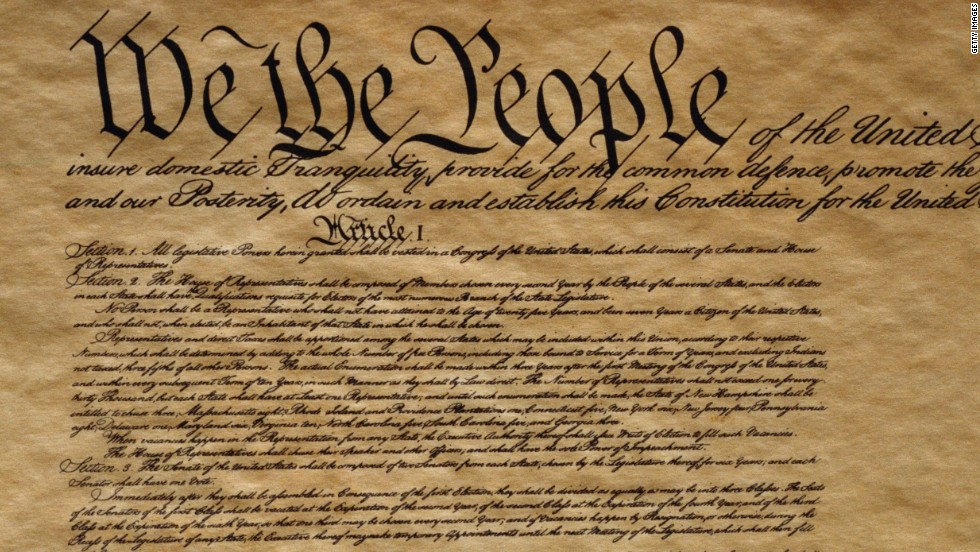My Take on the US Constitution
 |
| CNN, accessed 5/29/2018 |
The Constitution is only a framework by which we make our laws and define our government. We must consider the principles behind the Constitution, because it does not include qualifying information for every single potential case or situation. The genius of the US Constitution is its brevity and internal flexibility. We can change our laws and our government structures (albeit with some difficulty) through a defined and generally inclusive procedure that we, as citizens, can hold leaders accountable for and to. When the principles no longer are adequate, they must defer to the consequences of legislative, executive, and judicial choices and the empirical outcomes the different interpretations of law in order to get the best possible outcomes for the American people. This is, indeed, only my own interpretation of the US Constitution and the principles behind constitutional law. However, if my hypotheses are correct, this is the general way to achieve the best possible outcomes for the human society that the government is embedded in, and for the government officials themselves who are always, somehow, accountable to the general public. Pragmatic flexibility with a mind towards creating empirically better outcomes in the society for most, if not all citizens is a great guide for when the two-hundred-plus year document is mute or otherwise vague in its meaning. This not only preserves the general well-being of society, but also ensures the institutions of government remain stable, which then helps the society again by providing a basis of legitimate order within the society from which people can predictably and effectively maneuver and live their lives within. I've said before that deregulation or laissez-faire, the choice of the government to not act or intervene, generally favors those who already have power, and can easily lead to a tyranny of private individuals at the expense of most people in society.
What set the United States apart from most countries is that its governments had a generally strong logic to help the broadest possible swath of society at the expense of creating a few people of extreme privilege and influence. Our tax dollars used to go towards providing services and producing projects that benefited all or most people at the absolute expense of the wealthiest people; they did not usually go towards the largess and excess of a private or public elite. This distinction as a nation has since eroded since the 1930s when it was first started by then President Roosevelt. President Roosevelt failed to prosecute the business leaders involved in the Business Plot of 1934, which then left those antisocial elements of society to bide their time for a new era when the government and intellectual worlds faltered. In the 1960s Robert and John Kennedy were assassinated, along with the Reverend Dr. Martin Luther King Jr., the three people who could have pivoted the US from inside and outside towards a more just and robust social unit. Alas, President Johnson succeeded President Kennedy, got bogged down in the Vietnam War because of America's antisocial crowd, and failed to invest in people and places significantly. New academic schools started that were funded by the antisocial elements of society, which gave birth to President Nixon, who failed to act fast enough or effectively enough to save the US economy from stagflation. President Ford didn't last long enough in office, but President Carter continued on supporting a feeble government approach to the economy and society (thanks in no small part to academic quacks like Hayek and Friedman), until finally President Reagan came to power on President Carter's weaknesses and officially started the US on its downward spiral to its current position in terms of global influence and domestic fragility.
History cannot be changed. However, we can change our interpretations, perspectives, attitudes, and outlooks on society and government to bring us back to an internal state that is better for all Americans, and an external state that is positively accepted and appropriate for the rest of the world's people. Right-wing ideologies have proven themselves in the American context to be wholly destructive and detrimental to the well-being of citizens at home, and people throughout the world. I think it is time we consign those ideas, ideologies, and most importantly, people, to the dustbin of history where they seem to be happiest living in. We cannot afford to keep making these same mistakes and electing the same types of people, and expect to survive as a nation or people while those savage few cannibalize our people, environment, and wealth for their individual gain. We can either reform ourselves as a country and government, or we can hang ourselves by our own ignorance and blind faith in people and ideas that have no positive effect on our world for individuals or groups of individuals.
Comments
Post a Comment